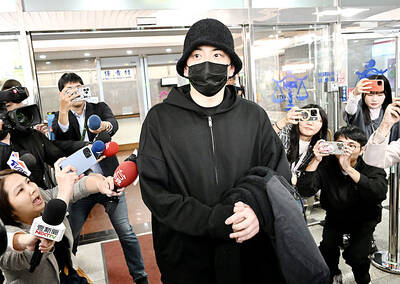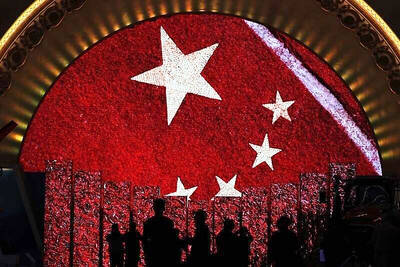China believes that the US’ ballistic missile defense (BMD) policy is “emboldening those on Taiwan who want to formalize the island’s separation from China,” a US congressional report said.
It said that Beijing believes that its conventional missile deterrent against Taiwan is being undermined by US ballistic missile defense assets.
At the same time, Chinese officials and academics see Washington’s ballistic missile defense deployments as a threat and a danger to strategic stability, the report said.
The report, Ballistic Missile Defense in the Asia-Pacific Region, was sent this week US Congress members by the Congressional Research Service.
The modernization and growing numbers of ballistic missiles in the Asia-Pacific region poses a security challenge for the US and its allies, and is of “concern,” it said.
“The US has made BMD a central component of protection for forward-deployed US forces and extended deterrence for allied security,” the report said.
Configuration of sensors, command and control centers, and ballistic missile defense assets in the region has slowly evolved with contributions from treaty allies, primarily Japan, Australia and South Korea, the report said.
“China’s strategic missile forces, known as the Second Artillery, field conventionally armed ballistic missiles believed to be intended to deter Taiwan from formalizing its de facto separation from China,” the report said.
It says that almost all of China’s short-range ballistic missiles — numbering more than 1,000 — are deployed opposite Taiwan.
“Chinese military scholars have warned that US BMD programs, and particularly the sale of BMD systems to Taiwan, send wrong signals to the Taiwan independence forces,” the report said.
It said the implication is that these missile programs might give the Taiwanese a sense of greater security, causing some to ignore the Chinese missile threat and actively resist China’s efforts to unify with Taiwan.
“The US has been unsympathetic to this set of Chinese concerns, and it has sold Taiwan limited missile defense infrastructure,” the report said.
In the 1990s, the US sold Taiwan three Patriot Advanced Capability (PAC) missile defense units with PAC-2 Guidance Enhanced Missiles.
Additional sales of PAC-3 systems were made to Taiwan in 2008 and 2010.

The National Immigration Agency (NIA) said yesterday that it will revoke the dependent-based residence permit of a Chinese social media influencer who reportedly “openly advocated for [China’s] unification through military force” with Taiwan. The Chinese national, identified by her surname Liu (劉), will have her residence permit revoked in accordance with Article 14 of the “Measures for the permission of family- based residence, long-term residence and settlement of people from the Mainland Area in the Taiwan Area,” the NIA said in a news release. The agency explained it received reports that Liu made “unifying Taiwan through military force” statements on her online

A magnitude 5.7 earthquake struck off Taitung County at 1:09pm today, the Central Weather Administration (CWA) said. The hypocenter was 53km northeast of Taitung County Hall at a depth of 12.5km, CWA data showed. The intensity of the quake, which gauges the actual effect of a seismic event, measured 4 in Taitung County and Hualien County on Taiwan's seven-tier intensity scale, the data showed. The quake had an intensity of 3 in Nantou County, Chiayi County, Yunlin County, Kaohsiung and Tainan, the data showed. There were no immediate reports of damage following the quake.

Actor Darren Wang (王大陸) is to begin his one-year alternative military service tomorrow amid ongoing legal issues, the Ministry of the Interior said yesterday. Wang, who last month was released on bail of NT$150,000 (US$4,561) as he faces charges of allegedly attempting to evade military service and forging documents, has been ordered to report to Taipei Railway Station at 9am tomorrow, the Alternative Military Service Training and Management Center said. The 33-year-old would join about 1,300 other conscripts in the 263rd cohort of general alternative service for training at the Chenggong Ling camp in Taichung, a center official told reporters. Wang would first

A BETRAYAL? It is none of the ministry’s business if those entertainers love China, but ‘you cannot agree to wipe out your own country,’ the MAC minister said Taiwanese entertainers in China would have their Taiwanese citizenship revoked if they are holding Chinese citizenship, Mainland Affairs Council (MAC) Minister Chiu Chui-cheng (邱垂正) said. Several Taiwanese entertainers, including Patty Hou (侯佩岑) and Ouyang Nana (歐陽娜娜), earlier this month on their Weibo (微博) accounts shared a picture saying that Taiwan would be “returned” to China, with tags such as “Taiwan, Province of China” or “Adhere to the ‘one China’ principle.” The MAC would investigate whether those Taiwanese entertainers have Chinese IDs and added that it would revoke their Taiwanese citizenship if they did, Chiu told the Chinese-language Liberty Times (sister paper